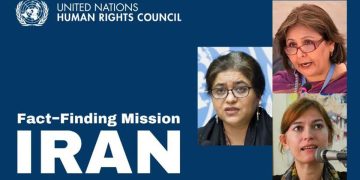In recent developments, members of the clerical regime’s Parliament have intensified their pressure on the government to implement the controversial Hijab Law, despite the fact that its enforcement had been temporarily halted by the Supreme National Security Council (SNSC).
On January 4th, Kamran Ghazanfari, a parliamentary deputy from Tehran, dismissed claims that the Supreme National Security Council had blocked the implementation of the law, calling it “a smear campaign.” He emphasized that the law, once officially enacted by the Parliament and communicated to the government, must be enforced regardless of the government’s stance.
Ghazanfari suggested that some government officials were trying to delay the law’s enforcement, citing claims that the country lacked the necessary infrastructure. He vehemently disagreed, stating that the infrastructure already existed.
This stance echoes the sentiments expressed by Hamid Rasai, another Tehran deputy, who called out the Speaker of the Parliament, Mohammad Baqer Qalibaf, for not fulfilling his duty to enact the law. Rasai questioned why Qalibaf had failed to issue the law despite setting a date for its enforcement. In his remarks on December 31st, Rasai pointed out that the delay in enforcing the law, under the pretext of national security concerns, was undermining the credibility of both Parliament and the Guardian Council.
In a public exchange in Parliament, Rasai expressed frustration, “If the law has been passed, it must be enacted.” Rasai criticized the delay as a direct affront to both the Parliament and the Guardian Council.
Qalibaf, in his response, acknowledged that the law was originally set to be enacted by December 13 but stated that the relevant authority had extended the deadline, a decision he claimed was beyond his control.
This escalating tug-of-war between Parliament and the government over the implementation of the Hijab law underscores the internal conflict within the regime regarding social and political control.
Members of the mullahs’ parliament insist on the implementation of this law, arguing that failure to enforce it reflects the regime’s weakness in asserting its authority. Meanwhile, government officials, fearing public resistance to the law and the potential spark it could ignite for widespread social unrest, have refrained from officially enacting it.
























